# Laptop Broadwell
| Support | Version |
|---|---|
| Initial macOS Support | OS X 10.10, Yosemite |
| Last Supported OS | macOS 12 Monterey |
| Note | For Ventura information, see macOS 13 Ventura |
# Starting Point
So making a config.plist may seem hard, it's not. It just takes some time but this guide will tell you how to configure everything, you won't be left in the cold. This also means if you have issues, review your config settings to make sure they're correct. Main things to note with OpenCore:
- All properties must be defined, there are no default OpenCore will fall back on so do not delete sections unless told explicitly so. If the guide doesn't mention the option, leave it at default.
- The Sample.plist cannot be used As-Is, you must configure it to your system
- DO NOT USE CONFIGURATORS, these rarely respect OpenCore's configuration and even some like Mackie's will add Clover properties and corrupt plists!
Now with all that, a quick reminder of the tools we need
- ProperTree (opens new window)
- Universal plist editor
- GenSMBIOS (opens new window)
- For generating our SMBIOS data
- Sample/config.plist (opens new window)
- See previous section on how to obtain: config.plist Setup
WARNING
Read this guide more than once before setting up OpenCore and make sure you have it set up correctly. Do note that images will not always be the most up-to-date so please read the text below them, if nothing's mentioned then leave as default.
# ACPI
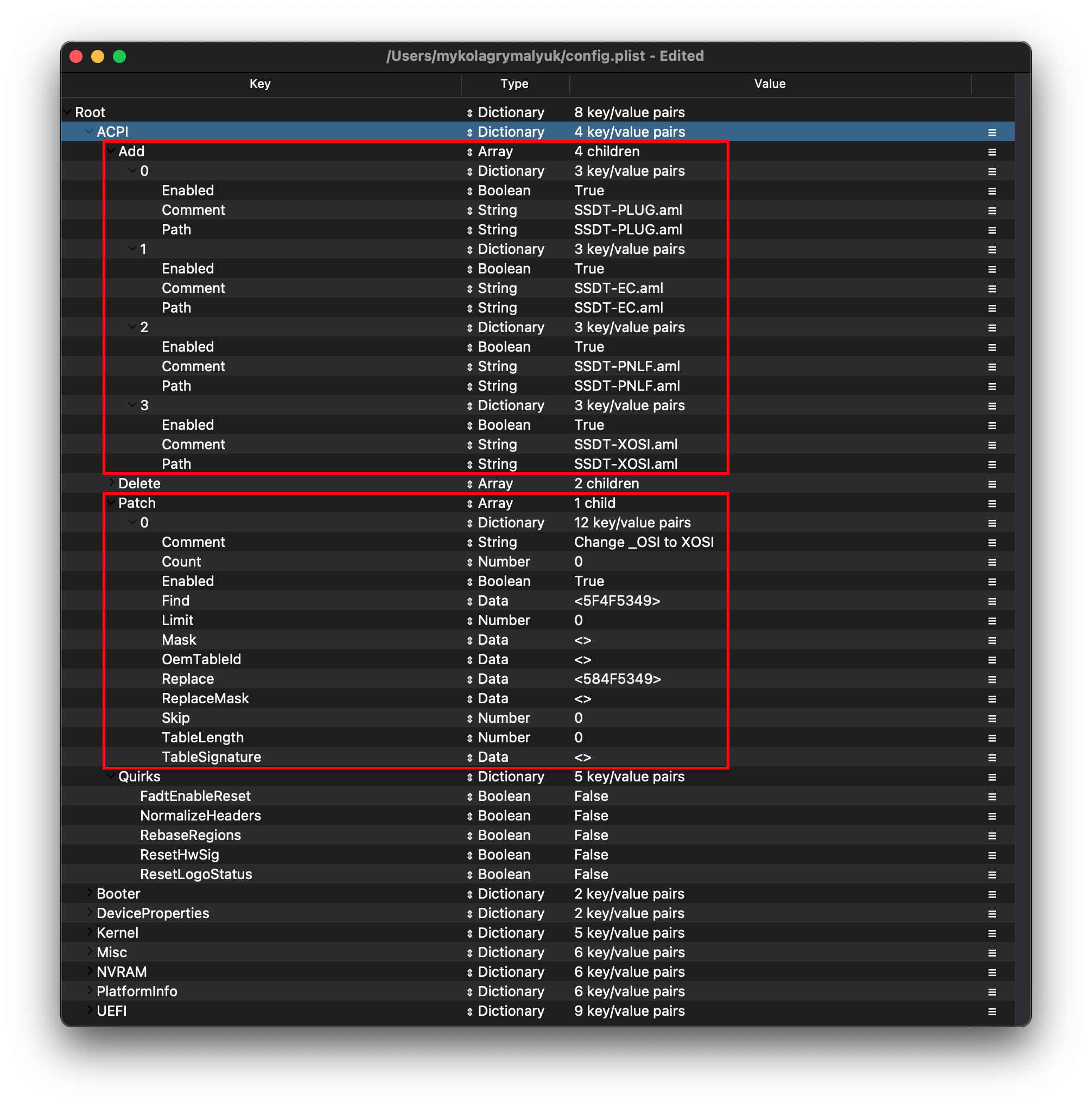
# Add
Info
This is where you'll add SSDTs for your system, these are very important to booting macOS and have many uses like USB maps (opens new window), disabling unsupported GPUs and such. And with our system, it's even required to boot. Guide on making them found here: Getting started with ACPI (opens new window)
For us we'll need a couple of SSDTs to bring back functionality that Clover provided:
| Required SSDTs | Description |
|---|---|
| SSDT-PLUG (opens new window) | Allows for native CPU power management on Haswell and newer, see Getting Started With ACPI Guide (opens new window) for more details. |
| SSDT-EC (opens new window) | Fixes the embedded controller, see Getting Started With ACPI Guide (opens new window) for more details. |
| SSDT-GPIO (opens new window) | Creates a stub so VoodooI2C can connect, for those having troubles getting VoodooI2C working can try SSDT-XOSI (opens new window) instead. Note that Intel NUCs do not need this |
| SSDT-PNLF (opens new window) | Fixes brightness control, see Getting Started With ACPI Guide (opens new window) for more details. Note that Intel NUCs do not need this |
Note that you should not add your generated DSDT.aml here, it is already in your firmware. So if present, remove the entry for it in your config.plist and under EFI/OC/ACPI.
For those wanting a deeper dive into dumping your DSDT, how to make these SSDTs, and compiling them, please see the Getting started with ACPI (opens new window) page. Compiled SSDTs have a .aml extension(Assembled) and will go into the EFI/OC/ACPI folder and must be specified in your config under ACPI -> Add as well.
# Delete
This blocks certain ACPI tables from loading, for us we can ignore this.
# Patch
Info
This section allows us to dynamically modify parts of the ACPI (DSDT, SSDT, etc.) via OpenCore. For us, we'll need the following:
- OSI rename
- This is required when using SSDT-XOSI as we redirect all OSI calls to this SSDT, this is not needed if you're using SSDT-GPIO
| Comment | String | Change _OSI to XOSI |
|---|---|---|
| Enabled | Boolean | YES |
| Count | Number | 0 |
| Limit | Number | 0 |
| Find | Data | 5f4f5349 |
| Replace | Data | 584f5349 |
# Quirks
Settings relating to ACPI, leave everything here as default as we have no use for these quirks.
# Booter
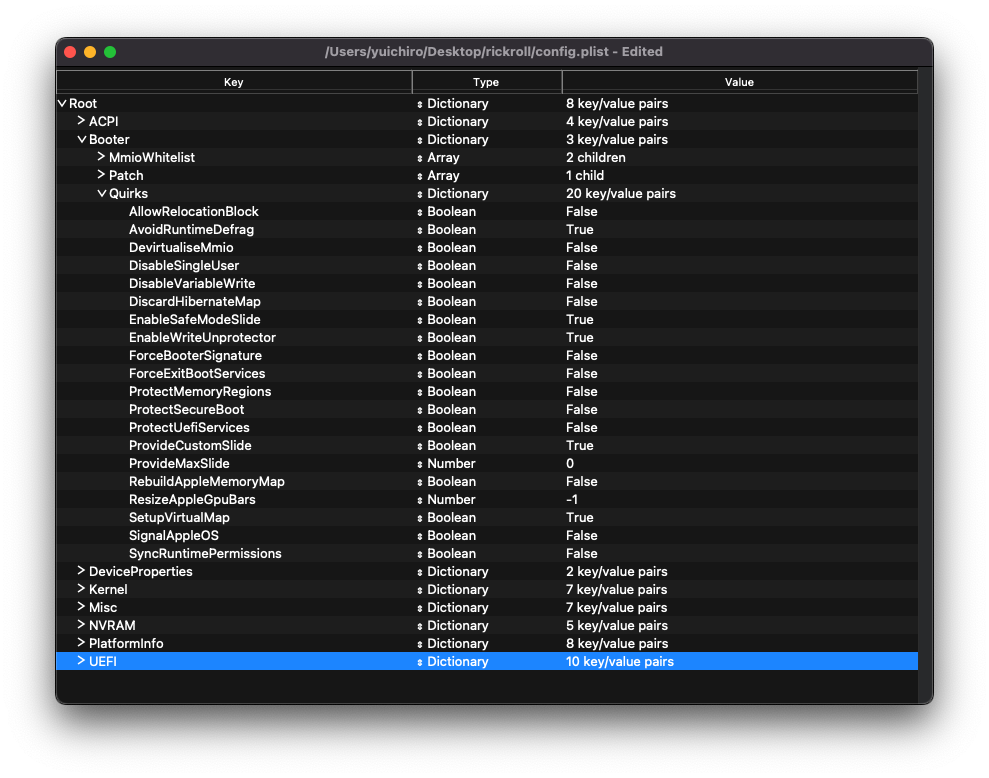
This section is dedicated to quirks relating to boot.efi patching with OpenRuntime, the replacement for AptioMemoryFix.efi
# MmioWhitelist
This section is allowing spaces to be pass-through to macOS that are generally ignored, useful when paired with DevirtualiseMmio
# Quirks
Info
Settings relating to boot.efi patching and firmware fixes, for us, we leave it as default
More in-depth Info
- AvoidRuntimeDefrag: YES
- Fixes UEFI runtime services like date, time, NVRAM, power control, etc
- EnableSafeModeSlide: YES
- Enables slide variables to be used in safe mode.
- EnableWriteUnprotector: YES
- Needed to remove write protection from CR0 register.
- ProvideCustomSlide: YES
- Used for Slide variable calculation. However the necessity of this quirk is determined by
OCABC: Only N/256 slide values are usable!message in the debug log. If the messageOCABC: All slides are usable! You can disable ProvideCustomSlide!is present in your log, you can disableProvideCustomSlide.
- Used for Slide variable calculation. However the necessity of this quirk is determined by
- SetupVirtualMap: YES
- Fixes SetVirtualAddresses calls to virtual addresses, required for Gigabyte boards to resolve early kernel panics
# DeviceProperties
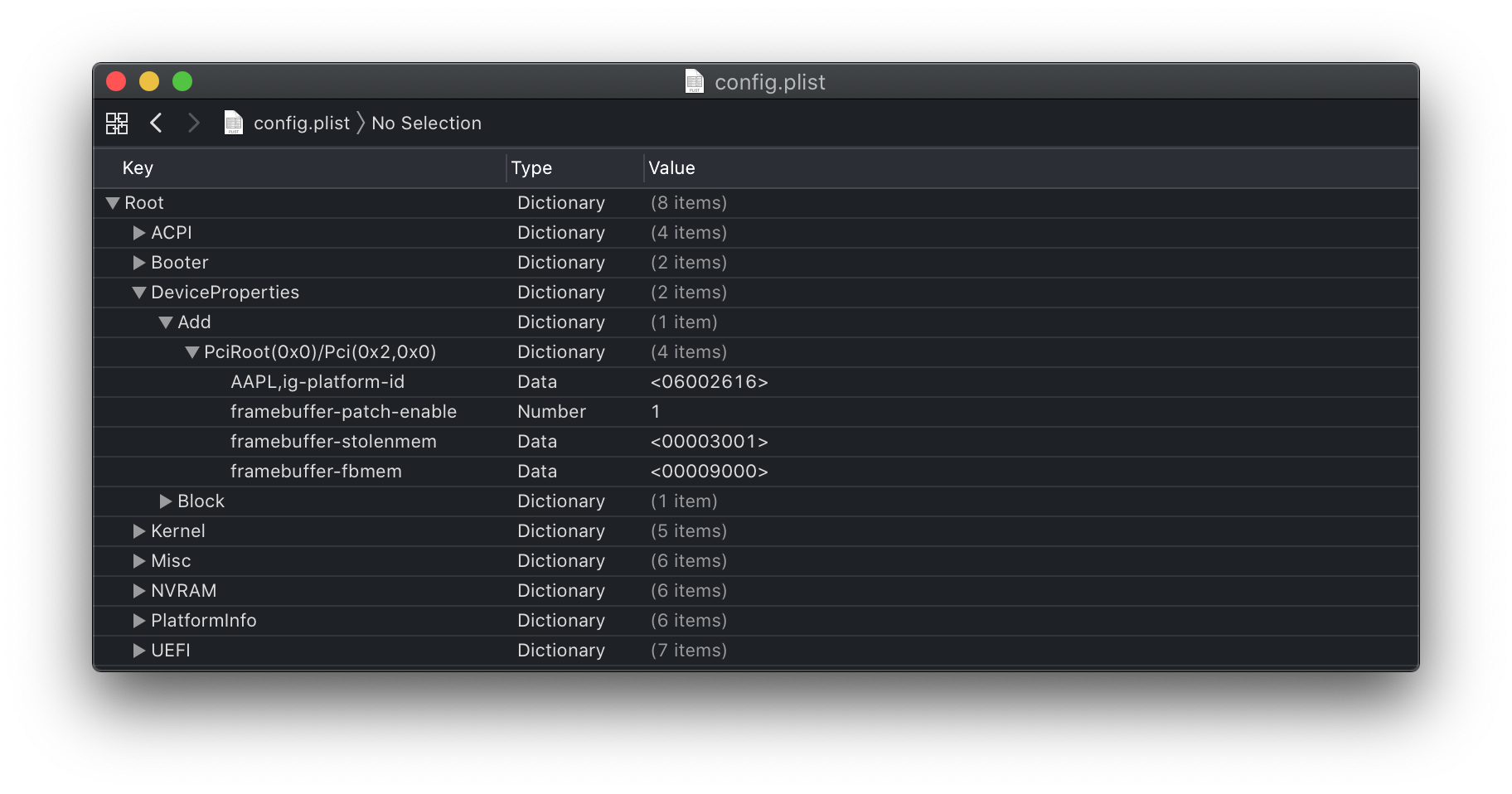
# Add
Sets device properties from a map.
PciRoot(0x0)/Pci(0x2,0x0)
This section is set up via WhateverGreen's Framebuffer Patching Guide (opens new window) and is used for setting important iGPU properties.
The config.plist doesn't already have a section for this so you will have to create it manually.
When setting up your iGPU, the table below should help with finding the right values to set. Here is an explanation of some values:
- AAPL,ig-platform-id
- This is used internally for setting up the iGPU
- Type
- Whether the entry is recommended for laptops(ie. with built-in displays) or for Intel NUCs(ie. stand alone boxes)
Generally follow these steps when setting up your iGPU properties. Follow the configuration notes below the table if they say anything different:
- When initially setting up your config.plist, only set AAPL,ig-platform-id - this is normally enough
- If you boot and you get no graphics acceleration (7MB VRAM and solid background for dock), then you likely need to try different
AAPL,ig-platform-idvalues, add stolenmem patches, or even add adevice-idproperty.
| AAPL,ig-platform-id | Type | Comment |
|---|---|---|
06002616 | Laptop | Recommended value for Broadwell laptops |
02001616 | NUC | Recommended value for Broadwell NUCs |
# Configuration Notes
- For HD 5600 you need
device-idfaked to26160000:
| Key | Type | Value |
|---|---|---|
| device-id | data | 26160000 |
- In some cases where you cannot set the DVMT-prealloc of these cards to 96MB higher in your UEFI Setup, you may get a kernel panic. Usually they're configured for 32MB of DVMT-prealloc, in that case these values are added to your iGPU Properties
| Key | Type | Value |
|---|---|---|
| framebuffer-patch-enable | Data | 01000000 |
| framebuffer-stolenmem | Data | 00003001 |
| framebuffer-fbmem | Data | 00009000 |
PciRoot(0x0)/Pci(0x1b,0x0)
layout-id
- Applies AppleALC audio injection, you'll need to do your own research on which codec your motherboard has and match it with AppleALC's layout. AppleALC Supported Codecs (opens new window).
- You can delete this property outright as it's unused for us at this time
For us, we'll be using the boot argument alcid=xxx instead to accomplish this. alcid will override all other layout-IDs present. More info on this is covered in the Post-Install Page (opens new window)
# Delete
Removes device properties from the map, for us we can ignore this
# Kernel
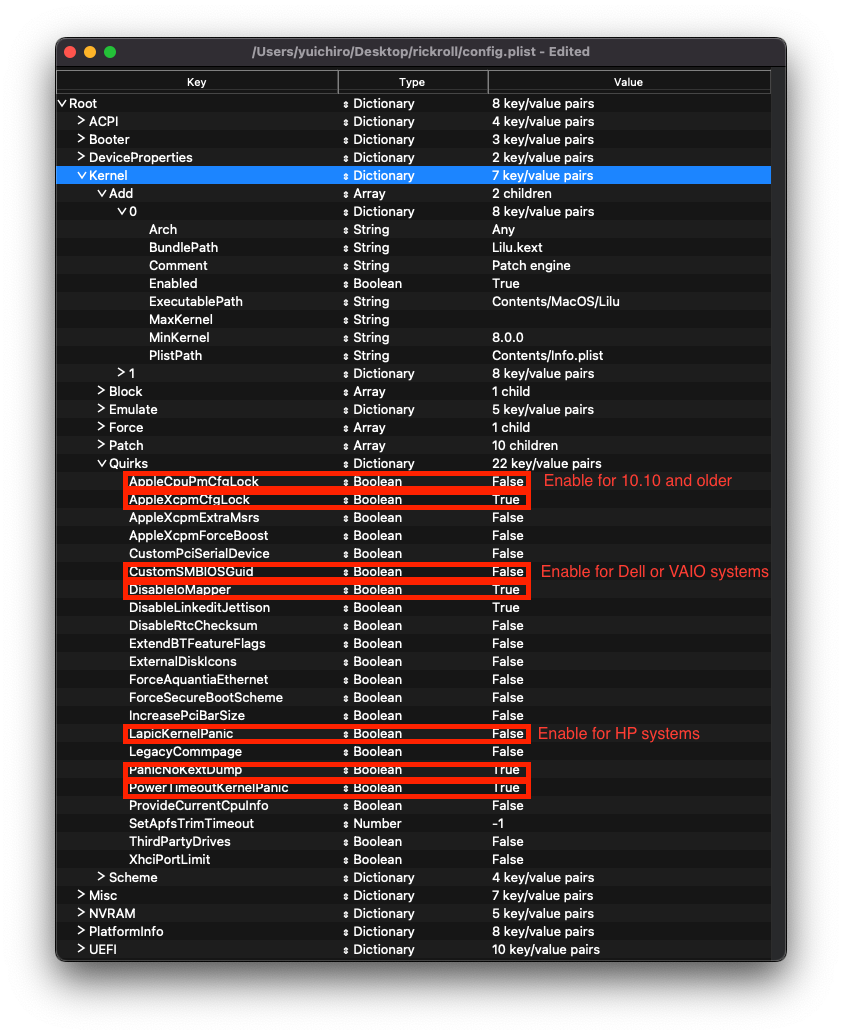
# Add
Here's where we specify which kexts to load, in what specific order to load, and what architectures each kext is meant for. By default we recommend leaving what ProperTree has done, however for 32-bit CPUs please see below:
More in-depth Info
The main thing you need to keep in mind is:
- Load order
- Remember that any plugins should load after its dependencies
- This means kexts like Lilu must come before VirtualSMC, AppleALC, WhateverGreen, etc
A reminder that ProperTree (opens new window) users can run Cmd/Ctrl + Shift + R to add all their kexts in the correct order without manually typing each kext out.
- Arch
- Architectures supported by this kext
- Currently supported values are
Any,i386(32-bit), andx86_64(64-bit)
- BundlePath
- Name of the kext
- ex:
Lilu.kext
- Enabled
- Self-explanatory, either enables or disables the kext
- ExecutablePath
- Path to the actual executable is hidden within the kext, you can see what path your kext has by right-clicking and selecting
Show Package Contents. Generally, they'll beContents/MacOS/Kextbut some have kexts hidden within underPluginfolder. Do note that plist only kexts do not need this filled in. - ex:
Contents/MacOS/Lilu
- Path to the actual executable is hidden within the kext, you can see what path your kext has by right-clicking and selecting
- MinKernel
- Lowest kernel version your kext will be injected into, see below table for possible values
- ex.
12.00.00for OS X 10.8
- MaxKernel
- Highest kernel version your kext will be injected into, see below table for possible values
- ex.
11.99.99for OS X 10.7
- PlistPath
- Path to the
info.plisthidden within the kext - ex:
Contents/Info.plist
- Path to the
Kernel Support Table
| OS X Version | MinKernel | MaxKernel |
|---|---|---|
| 10.4 | 8.0.0 | 8.99.99 |
| 10.5 | 9.0.0 | 9.99.99 |
| 10.6 | 10.0.0 | 10.99.99 |
| 10.7 | 11.0.0 | 11.99.99 |
| 10.8 | 12.0.0 | 12.99.99 |
| 10.9 | 13.0.0 | 13.99.99 |
| 10.10 | 14.0.0 | 14.99.99 |
| 10.11 | 15.0.0 | 15.99.99 |
| 10.12 | 16.0.0 | 16.99.99 |
| 10.13 | 17.0.0 | 17.99.99 |
| 10.14 | 18.0.0 | 18.99.99 |
| 10.15 | 19.0.0 | 19.99.99 |
| 11 | 20.0.0 | 20.99.99 |
| 12 | 21.0.0 | 21.99.99 |
| 13 | 22.0.0 | 22.99.99 |
| 14 | 23.0.0 | 23.99.99 |
| 15 | 24.0.0 | 24.99.99 |
# Emulate
Needed for spoofing unsupported CPUs like Pentiums and Celerons
- Cpuid1Mask: Leave this blank
- Cpuid1Data: Leave this blank
# Force
Used for loading kexts off system volume, only relevant for older operating systems where certain kexts are not present in the cache(ie. IONetworkingFamily in 10.6).
For us, we can ignore.
# Block
Blocks certain kexts from loading. Not relevant for us.
# Patch
Patches both the kernel and kexts.
# Quirks
Info
Settings relating to the kernel, for us we'll be changing the following:
| Quirk | Enabled | Comment |
|---|---|---|
| AppleCpuPmCfgLock | NO | Need if running 10.10 or older and cannot disable CFG-Lock in the BIOS |
| AppleXcpmCfgLock | YES | Not needed if CFG-Lock is disabled in the BIOS |
| DisableIoMapper | YES | Not needed if VT-D is disabled in the BIOS |
| LapicKernelPanic | NO | HP Machines will require this quirk |
| PanicNoKextDump | YES | |
| PowerTimeoutKernelPanic | YES | |
| XhciPortLimit | YES | Disable if running macOS 11.3+ |
More in-depth Info
- AppleCpuPmCfgLock: NO
- Only needed when CFG-Lock can't be disabled in BIOS
- Only applicable for Ivy Bridge and older
- Note: Broadwell and older require this when running 10.10 or older
- AppleXcpmCfgLock: YES
- Only needed when CFG-Lock can't be disabled in BIOS
- Only applicable for Haswell and newer
- Note: Ivy Bridge-E is also included as it's XCPM capable
- CustomSMBIOSGuid: NO
- Performs GUID patching for UpdateSMBIOSMode set to
Custom. Usually relevant for Dell laptops - Enabling this quirk with UpdateSMBIOSMode Custom mode can also disable SMBIOS injection into "non-Apple" OSes however we do not endorse this method as it breaks Bootcamp compatibility. Use at your own risk
- Performs GUID patching for UpdateSMBIOSMode set to
- DisableIoMapper: YES
- Needed to get around VT-D if either unable to disable in BIOS or needed for other operating systems, much better alternative to
dart=0as SIP can stay on in Catalina
- Needed to get around VT-D if either unable to disable in BIOS or needed for other operating systems, much better alternative to
- DisableIoMapperMapping: NO
- Needed if you are experiencing issues with Wi-Fi/Ethernet/Thunderbolt with VT-D enabled and more than 16GB of memory installed. This quirk requires a patched DMAR table (opens new window) with Reserved Memory Regions removed
- We recommend disabling VT-D, so we don't need this enabled
- Not needed for 13.2.1 and lower
- DisableLinkeditJettison: YES
- Allows Lilu and others to have more reliable performance without
keepsyms=1
- Allows Lilu and others to have more reliable performance without
- DisableRtcChecksum: NO
- Prevents AppleRTC from writing to primary checksum (0x58-0x59), required for users who either receive BIOS reset or are sent into Safe mode after reboot/shutdown
- ExtendBTFeatureFlags NO
- Helpful for those having continuity issues with non-Apple/non-Fenvi cards
- LapicKernelPanic: NO
- Disables kernel panic on AP core lapic interrupt, generally needed for HP systems. Clover equivalent is
Kernel LAPIC
- Disables kernel panic on AP core lapic interrupt, generally needed for HP systems. Clover equivalent is
- LegacyCommpage: NO
- Resolves SSSE3 requirement for 64 Bit CPUs in macOS, mainly relevant for 64-Bit Pentium 4 CPUs(ie. Prescott)
- PanicNoKextDump: YES
- Allows for reading kernel panics logs when kernel panics occur
- PowerTimeoutKernelPanic: YES
- Helps fix kernel panics relating to power changes with Apple drivers in macOS Catalina, most notably with digital audio.
- SetApfsTrimTimeout:
-1- Sets trim timeout in microseconds for APFS filesystems on SSDs, only applicable for macOS 10.14 and newer with problematic SSDs.
- XhciPortLimit: YES
- This is actually the 15 port limit patch, don't rely on it as it's not a guaranteed solution for fixing USB. Please create a USB map (opens new window) when possible.
- With macOS 11.3+, XhciPortLimit may not function as intended. (opens new window) We recommend users either disable this quirk and map before upgrading or map from Windows (opens new window). You may also install macOS 11.2.3 or older.
The reason being is that UsbInjectAll reimplements builtin macOS functionality without proper current tuning. It is much cleaner to just describe your ports in a single plist-only kext, which will not waste runtime memory and such
# Scheme
Settings related to legacy booting(ie. 10.4-10.6), for majority you can skip however for those planning to boot legacy OSes you can see below:
More in-depth Info
FuzzyMatch: True
- Used for ignoring checksums with kernelcache, instead opting for the latest cache available. Can help improve boot performance on many machines in 10.6
KernelArch: x86_64
- Set the kernel's arch type, you can choose between
Auto,i386(32-bit), andx86_64(64-bit). - If you're booting older OSes which require a 32-bit kernel(ie. 10.4 and 10.5) we recommend to set this to
Autoand let macOS decide based on your SMBIOS. See below table for supported values:- 10.4-10.5 —
x86_64,i386ori386-user32i386-user32refers 32-bit userspace, so 32-bit CPUs must use this(or CPUs missing SSSE3)x86_64will still have a 32-bit kernelspace however will ensure 64-bit userspace in 10.4/5
- 10.6 —
i386,i386-user32, orx86_64 - 10.7 —
i386orx86_64 - 10.8 or newer —
x86_64
- 10.4-10.5 —
- Set the kernel's arch type, you can choose between
KernelCache: Auto
- Set kernel cache type, mainly useful for debugging and so we recommend
Autofor best support
- Set kernel cache type, mainly useful for debugging and so we recommend
# Misc
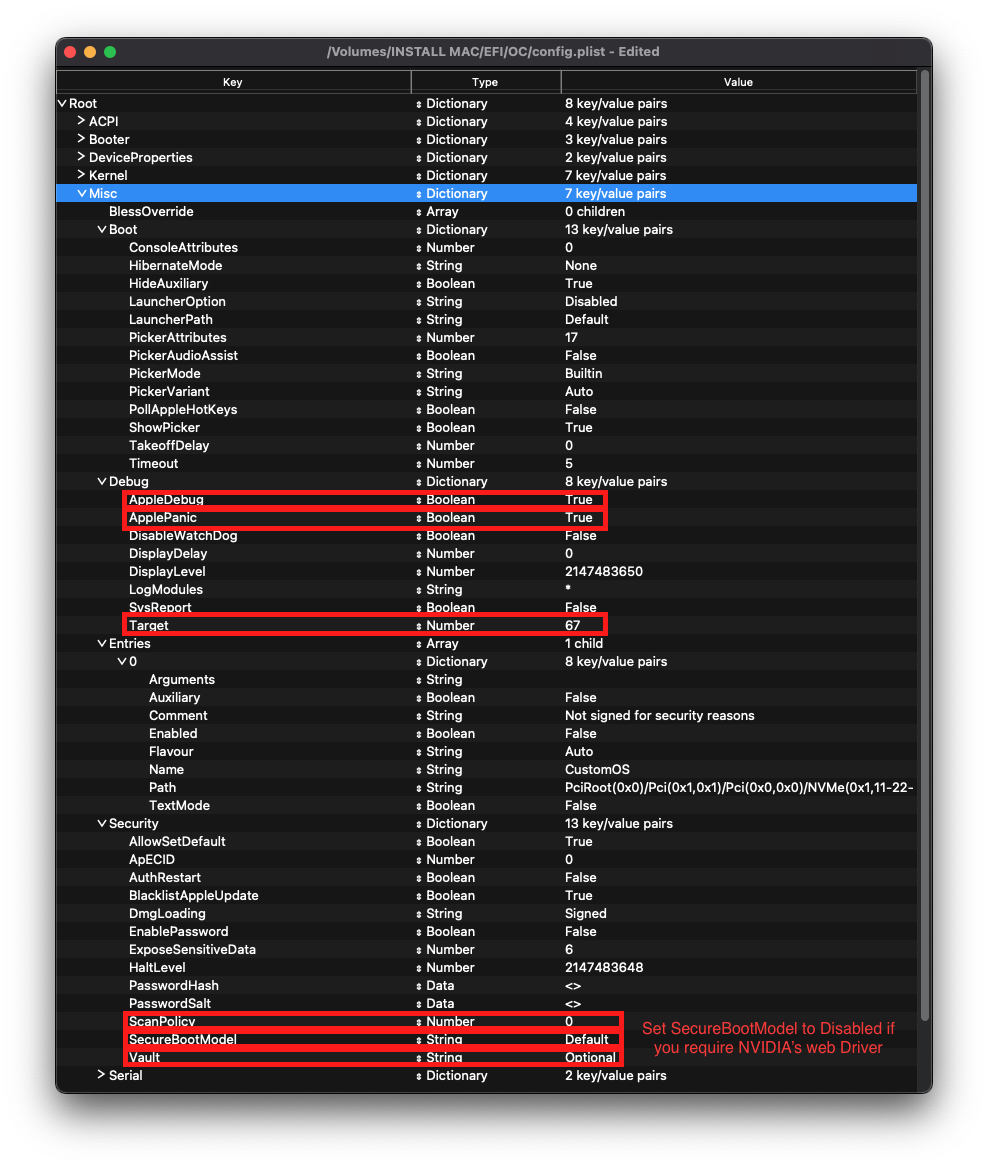
# Boot
Info
| Quirk | Enabled | Comment |
|---|---|---|
| HideAuxiliary | YES | Press space to show macOS recovery and other auxiliary entries |
More in-depth Info
- HideAuxiliary: YES
- This option will hide supplementary entries, such as macOS recovery and tools, in the picker. Hiding auxiliary entries may increase boot performance on multi-disk systems. You can press space at the picker to show these entries
# Debug
Info
Helpful for debugging OpenCore boot issues(We'll be changing everything but DisplayDelay):
| Quirk | Enabled |
|---|---|
| AppleDebug | YES |
| ApplePanic | YES |
| DisableWatchDog | YES |
| Target | 67 |
More in-depth Info
- AppleDebug: YES
- Enables boot.efi logging, useful for debugging. Note this is only supported on 10.15.4 and newer
- ApplePanic: YES
- Attempts to log kernel panics to disk
- DisableWatchDog: YES
- Disables the UEFI watchdog, can help with early boot issues
- DisplayLevel:
2147483650- Shows even more debug information, requires debug version of OpenCore
- SysReport: NO
- Helpful for debugging such as dumping ACPI tables
- Note that this is limited to DEBUG versions of OpenCore
- Target:
67- Shows more debug information, requires debug version of OpenCore
These values are based of those calculated in OpenCore debugging
# Security
Info
Security is pretty self-explanatory, do not skip. We'll be changing the following:
| Quirk | Enabled | Comment |
|---|---|---|
| AllowSetDefault | YES | |
| BlacklistAppleUpdate | YES | |
| ScanPolicy | 0 | |
| SecureBootModel | Default | Leave this as Default for OpenCore to automatically set the correct value corresponding to your SMBIOS. The next page goes into more detail about this setting. |
| Vault | Optional | This is a word, it is not optional to omit this setting. You will regret it if you don't set it to Optional, note that it is case-sensitive |
More in-depth Info
AllowSetDefault: YES
- Allow
CTRL+EnterandCTRL+Indexto set default boot device in the picker
- Allow
ApECID: 0
- Used for netting personalized secure-boot identifiers, currently this quirk is unreliable due to a bug in the macOS installer so we highly encourage you to leave this as default.
AuthRestart: NO
- Enables Authenticated restart for FileVault 2 so password is not required on reboot. Can be considered a security risk so optional
BlacklistAppleUpdate: YES
- Used for blocking firmware updates, used as extra level of protection as macOS Big Sur no longer uses
run-efi-updatervariable
- Used for blocking firmware updates, used as extra level of protection as macOS Big Sur no longer uses
DmgLoading: Signed
- Ensures only signed DMGs load
ExposeSensitiveData:
6- Shows more debug information, requires debug version of OpenCore
Vault:
Optional- We won't be dealing vaulting so we can ignore, you won't boot with this set to Secure
- This is a word, it is not optional to omit this setting. You will regret it if you don't set it to
Optional, note that it is case-sensitive
ScanPolicy:
00allows you to see all drives available, please refer to Security (opens new window) section for further details. Will not boot USB devices with this set to default
SecureBootModel: Default
- Controls Apple's secure boot functionality in macOS, please refer to Security (opens new window) section for further details.
- Note: Users may find upgrading OpenCore on an already installed system can result in early boot failures. To resolve this, see here: Stuck on OCB: LoadImage failed - Security Violation
# Serial
Used for serial debugging (Leave everything as default).
# Tools
Used for running OC debugging tools like the shell, ProperTree's snapshot function will add these for you.
# Entries
Used for specifying irregular boot paths that can't be found naturally with OpenCore.
Won't be covered here, see 8.6 of Configuration.pdf (opens new window) for more info
# NVRAM
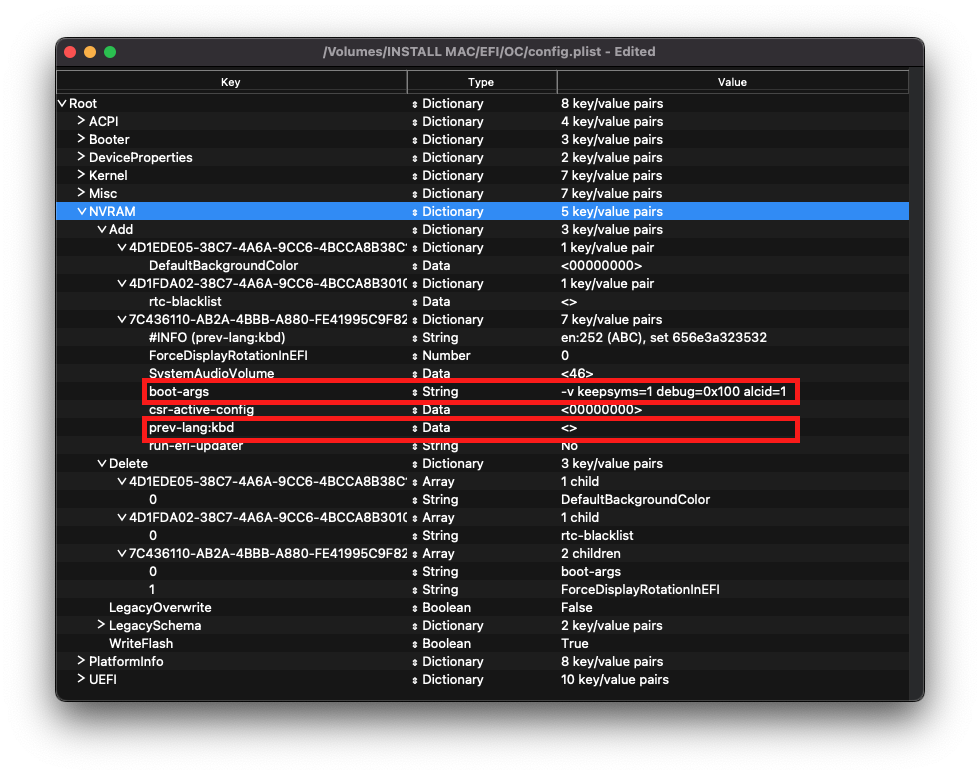
# Add
4D1EDE05-38C7-4A6A-9CC6-4BCCA8B38C14
Used for OpenCore's UI scaling, default will work for us. See in-depth section for more info
More in-depth Info
Booter Path, mainly used for UI modification
- DefaultBackgroundColor: Background color used by boot.efi
00000000: Syrah BlackBFBFBF00: Light Gray
4D1FDA02-38C7-4A6A-9CC6-4BCCA8B30102
OpenCore's NVRAM GUID, mainly relevant for RTCMemoryFixup users
More in-depth Info
- rtc-blacklist: <>
- To be used in conjunction with RTCMemoryFixup, see here for more info: Fixing RTC write issues (opens new window)
- Most users can ignore this section
7C436110-AB2A-4BBB-A880-FE41995C9F82
System Integrity Protection bitmask
- General Purpose boot-args:
| boot-args | Description |
|---|---|
| -v | This enables verbose mode, which shows all the behind-the-scenes text that scrolls by as you're booting instead of the Apple logo and progress bar. It's invaluable to any Hackintosher, as it gives you an inside look at the boot process, and can help you identify issues, problem kexts, etc. |
| debug=0x100 | This disables macOS's watchdog which helps prevents a reboot on a kernel panic. That way you can hopefully glean some useful info and follow the breadcrumbs to get past the issues. |
| keepsyms=1 | This is a companion setting to debug=0x100 that tells the OS to also print the symbols on a kernel panic. That can give some more helpful insight as to what's causing the panic itself. |
| alcid=1 | Used for setting layout-id for AppleALC, see supported codecs (opens new window) to figure out which layout to use for your specific system. More info on this is covered in the Post-Install Page (opens new window) |
- GPU-Specific boot-args:
| boot-args | Description |
|---|---|
| -wegnoegpu | Used for disabling all other GPUs than the integrated Intel iGPU, useful for those wanting to run newer versions of macOS where their dGPU isn't supported |
csr-active-config:
00000000- Settings for 'System Integrity Protection' (SIP). It is generally recommended to change this with
csrutilvia the recovery partition. - csr-active-config by default is set to
00000000which enables System Integrity Protection. You can choose a number of different values but overall we recommend keeping this enabled for best security practices. More info can be found in our troubleshooting page: Disabling SIP
- Settings for 'System Integrity Protection' (SIP). It is generally recommended to change this with
run-efi-updater:
No- This is used to prevent Apple's firmware update packages from installing and breaking boot order; this is important as these firmware updates (meant for Macs) will not work.
prev-lang:kbd: <>
- Needed for non-latin keyboards in the format of
lang-COUNTRY:keyboard, recommended to keep blank though you can specify it(Default in Sample config is Russian): - American:
en-US:0(656e2d55533a30in HEX) - Full list can be found in AppleKeyboardLayouts.txt (opens new window)
- Hint:
prev-lang:kbdcan be changed into a String so you can inputen-US:0directly instead of converting to HEX - Hint 2:
prev-lang:kbdcan be set to a blank variable (eg.<>) which will force the Language Picker to appear instead at first boot up.
- Needed for non-latin keyboards in the format of
| Key | Type | Value |
|---|---|---|
| prev-lang:kbd | String | en-US:0 |
# Delete
Forcibly rewrites NVRAM variables, do note that Add will not overwrite values already present in NVRAM so values like boot-args should be left alone.
LegacySchema
- Used for assigning NVRAM variables, used with
OpenVariableRuntimeDxe.efi. Only needed for systems without native NVRAM
- Used for assigning NVRAM variables, used with
WriteFlash: YES
- Enables writing to flash memory for all added variables.
# PlatformInfo
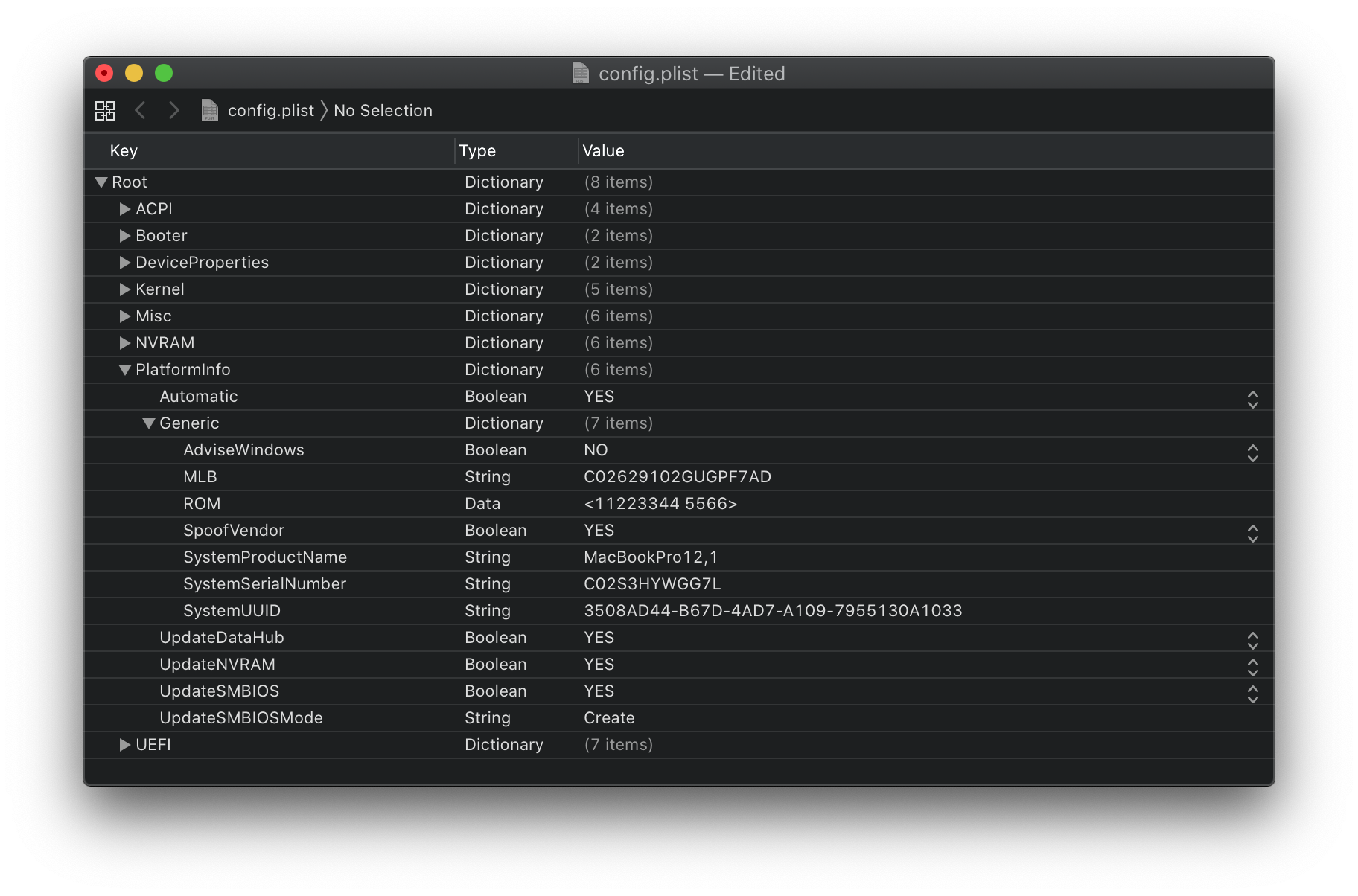
Info
For setting up the SMBIOS info, we'll use CorpNewt's GenSMBIOS (opens new window) application.
For this Broadwell example, we chose the MacBookPro12,1 SMBIOS. The typical breakdown is as follows:
| SMBIOS | CPU Type | GPU Type | Display Size |
|---|---|---|---|
| MacBook8,1 | Dual Core 7W(Low End) | iGPU: HD 5300 | 12" |
| MacBookAir7,1 | Dual Core 15W | iGPU: HD 6000 | 11" |
| MacBookAir7,2 | Dual Core 15W | iGPU: HD 6000 | 13" |
| MacBookPro12,1 | Dual Core 28W(High End) | iGPU: Iris 6100 | 13" |
| MacBookPro11,2 | Quad Core 45W | iGPU: Iris Pro 5200 | 15" |
| MacBookPro11,3 | Quad Core 45W | iGPU: Iris Pro 5200 + dGPU: GT 750M | 15" |
| MacBookPro11,4 | Quad Core 45W | iGPU: Iris Pro 5200 | 15" |
| MacBookPro11,5 | Quad Core 45W | iGPU: Iris Pro 5200 + dGPU: R9 M370X | 15" |
| iMac16,1 | NUC Systems | HD 6000/Iris Pro 6200 | N/A |
Note: MacBook8,1 was dropped in macOS Monterey. If running macOS Monterey, select another model.
Run GenSMBIOS, pick option 1 for downloading MacSerial and Option 3 for selecting out SMBIOS. This will give us an output similar to the following:
#######################################################
# MacBookPro12,1 SMBIOS Info #
#######################################################
Type: MacBookPro12,1
Serial: C02M9SYJFY10
Board Serial: C02408101J9G2Y7A8
SmUUID: 7B227BEC-660D-405F-8E60-411B3E4EF055
The Type part gets copied to Generic -> SystemProductName.
The Serial part gets copied to Generic -> SystemSerialNumber.
The Board Serial part gets copied to Generic -> MLB.
The SmUUID part gets copied to Generic -> SystemUUID.
We set Generic -> ROM to either an Apple ROM (dumped from a real Mac), your NIC MAC address, or any random MAC address (could be just 6 random bytes, for this guide we'll use 11223300 0000. After install follow the Fixing iServices (opens new window) page on how to find your real MAC Address)
Reminder that you need an invalid serial! When inputting your serial number in Apple's Check Coverage Page (opens new window), you should get a message such as "Unable to check coverage for this serial number."
Automatic: YES
- Generates PlatformInfo based on Generic section instead of DataHub, NVRAM, and SMBIOS sections
# Generic
More in-depth Info
AdviseFeatures: NO
- Used for when the EFI partition isn't first on the Windows drive
MaxBIOSVersion: NO
- Sets BIOS version to Max to avoid firmware updates in Big Sur+, mainly applicable for genuine Macs.
ProcessorType:
0- Set to
0for automatic type detection, however this value can be overridden if desired. See AppleSmBios.h (opens new window) for possible values
- Set to
SpoofVendor: YES
- Swaps vendor field for Acidanthera, generally not safe to use Apple as a vendor in most case
SystemMemoryStatus: Auto
- Sets whether memory is soldered or not in SMBIOS info, purely cosmetic and so we recommend
Auto
- Sets whether memory is soldered or not in SMBIOS info, purely cosmetic and so we recommend
UpdateDataHub: YES
- Update Data Hub fields
UpdateNVRAM: YES
- Update NVRAM fields
UpdateSMBIOS: YES
- Updates SMBIOS fields
UpdateSMBIOSMode: Create
- Replace the tables with newly allocated EfiReservedMemoryType, use
Customon Dell laptops requiringCustomSMBIOSGuidquirk - Setting to
CustomwithCustomSMBIOSGuidquirk enabled can also disable SMBIOS injection into "non-Apple" OSes however we do not endorse this method as it breaks Bootcamp compatibility. Use at your own risk
- Replace the tables with newly allocated EfiReservedMemoryType, use
# UEFI
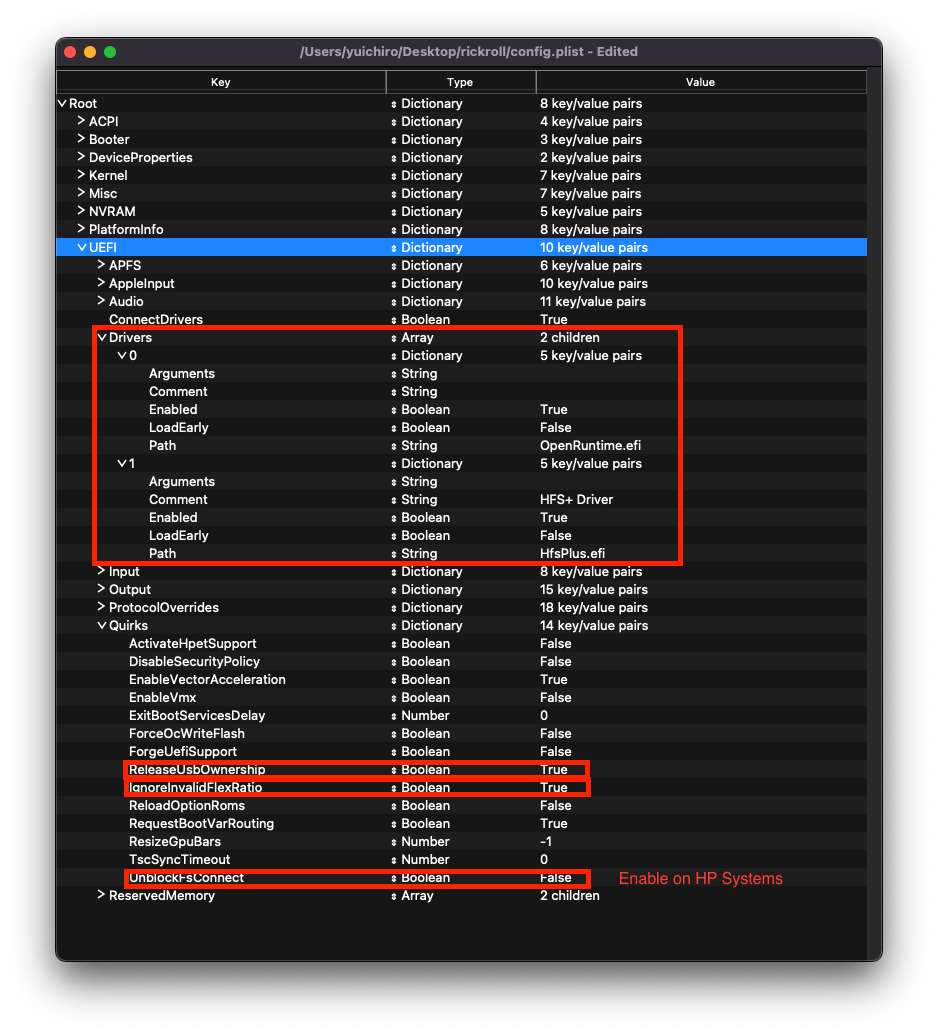
ConnectDrivers: YES
- Forces .efi drivers, change to NO will automatically connect added UEFI drivers. This can make booting slightly faster, but not all drivers connect themselves. E.g. certain file system drivers may not load.
# Drivers
Add your .efi drivers here.
Only drivers present here should be:
- HfsPlus.efi
- OpenRuntime.efi
More in-depth Info
| Key | Type | Description |
|---|---|---|
| Path | String | Path of the file from OC/Drivers directory |
| LoadEarly | Boolean | Load the driver early before NVRAM setup, should only be enabled for OpenRuntime.efi and OpenVariableRuntimeDxe.efi if using legacy NVRAM |
| Arguments | String | Some drivers accept additional arguments which are specified here. |
# APFS
By default, OpenCore only loads APFS drivers from macOS Big Sur and newer. If you are booting macOS Catalina or earlier, you may need to set a new minimum version/date. Not setting this can result in OpenCore not finding your macOS partition!
macOS Sierra and earlier use HFS instead of APFS. You can skip this section if booting older versions of macOS.
APFS Versions
Both MinVersion and MinDate need to be set if changing the minimum version.
| macOS Version | Min Version | Min Date |
|---|---|---|
High Sierra (10.13.6) | 748077008000000 | 20180621 |
Mojave (10.14.6) | 945275007000000 | 20190820 |
Catalina (10.15.4) | 1412101001000000 | 20200306 |
| No restriction | -1 | -1 |
# Audio
Related to AudioDxe settings, for us we'll be ignoring(leave as default). This is unrelated to audio support in macOS.
- For further use of AudioDxe and the Audio section, please see the Post Install page: Add GUI and Boot-chime (opens new window)
# Input
Related to boot.efi keyboard passthrough used for FileVault and Hotkey support, leave everything here as default as we have no use for these quirks. See here for more details: Security and FileVault (opens new window)
# Output
Relating to OpenCore's visual output, leave everything here as default as we have no use for these quirks.
More in-depth Info
| Output | Value | Comment |
|---|---|---|
| UIScale | 0 | 0 will automatically set based on resolution-1 will leave it unchanged1 for 1x scaling, for normal displays2 for 2x scaling, for HiDPI displays |
# ProtocolOverrides
Mainly relevant for Virtual machines, legacy macs and FileVault users. See here for more details: Security and FileVault (opens new window)
# Quirks
Info
Relating to quirks with the UEFI environment, for us we'll be changing the following:
| Quirk | Enabled | Comment |
|---|---|---|
| IgnoreInvalidFlexRatio | YES | |
| ReleaseUsbOwnership | YES | |
| UnblockFsConnect | NO | Needed mainly by HP motherboards |
More in-depth Info
IgnoreInvalidFlexRatio: YES
- Fix for when MSR_FLEX_RATIO (0x194) can't be disabled in the BIOS, required for all pre-Skylake based systems
ReleaseUsbOwnership: YES
- Releases USB controller from firmware driver, needed for when your firmware doesn't support EHCI/XHCI Handoff. Most laptops have garbage firmwares so we'll need this as well
DisableSecurityPolicy: NO
- Disables platform security policy in firmware, recommended for buggy firmwares where disabling Secure Boot does not allow 3rd party firmware drivers to load.
- If running a Microsoft Surface device, recommended to enable this option
RequestBootVarRouting: YES
- Redirects AptioMemoryFix from
EFI_GLOBAL_VARIABLE_GUIDtoOC_VENDOR_VARIABLE_GUID. Needed for when firmware tries to delete boot entries and is recommended to be enabled on all systems for correct update installation, Startup Disk control panel functioning, etc.
- Redirects AptioMemoryFix from
UnblockFsConnect: NO
- Some firmware block partition handles by opening them in By Driver mode, which results in File System protocols being unable to install. Mainly relevant for HP systems when no drives are listed
# ReservedMemory
Used for exempting certain memory regions from OSes to use, mainly relevant for Sandy Bridge iGPUs or systems with faulty memory. Use of this quirk is not covered in this guide
# Cleaning up
And now you're ready to save and place it into your EFI under EFI/OC.
For those having booting issues, please make sure to read the Troubleshooting section first and if your questions are still unanswered we have plenty of resources at your disposal:
# Config reminders
HP Users:
- Kernel -> Quirks -> LapicKernelPanic -> True
- You will get a kernel panic on LAPIC otherwise
- UEFI -> Quirks -> UnblockFsConnect -> True
# Intel BIOS settings
- Note: Most of these options may not be present in your firmware, we recommend matching up as closely as possible but don't be too concerned if many of these options are not available in your BIOS
# Disable
- Fast Boot
- Secure Boot
- Serial/COM Port
- Parallel Port
- VT-d (can be enabled if you set
DisableIoMapperto YES) - Compatibility Support Module (CSM) (Must be off in most cases, GPU errors/stalls like
gIOare common when this option is enabled) - Thunderbolt(For initial install, as Thunderbolt can cause issues if not setup correctly)
- Intel SGX
- Intel Platform Trust
- CFG Lock (MSR 0xE2 write protection)(This must be off, if you can't find the option then enable
AppleXcpmCfgLockunder Kernel -> Quirks. Your hack will not boot with CFG-Lock enabled)- For 10.10 and older, you'll need to enable AppleCpuPmCfgLock as well
# Enable
- VT-x
- Above 4G Decoding
- Hyper-Threading
- Execute Disable Bit
- EHCI/XHCI Hand-off
- OS type: Windows 8.1/10 UEFI Mode (some motherboards may require "Other OS" instead)
- DVMT Pre-Allocated(iGPU Memory): 64MB or higher
- SATA Mode: AHCI
